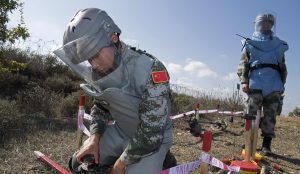UNIFIL and its strategic partner, the Lebanese Armed Forces (LAF) signed a Memorandum of Understanding (MoU) allowing for the two forces to enhance cooperation, after a decade, in humanitarian demining within the UN Mission’s area of operation in south Lebanon.
The MoU – signed by UNIFIL Chief of Staff Brigadier General Frédéric Boucher and the Director of the Lebanon Mine Action Centre (LMAC) Brigadier General Gihad Al Bechelany – sets out a framework of cooperation for UNIFIL assistance, without prejudice to its mandate and within existing capabilities and resources, to LMAC’s humanitarian demining operations in UNIFIL’s 1,060 square kilometres area of operation between the Litani River and the Blue Line.
In the wake of the 2006 war and till 2010, UNIFIL deminers conducted, within the framework of UN Security Council resolution 1701, humanitarian demining in order to protect civilians and to facilitate safe access to dwellings and agricultural land. Due to operational requirements of its mandate to facilitate the Blue Line marking, and to ensure the safety of patrols carried out by UNIFIL peacekeepers, these activities were suspended in 2010.
“Now, after 10 years, the operational situation allows us again to resume our efforts in the area of humanitarian demining,” said Brig. Gen. Boucher after signing the MoU in the LAF’s Regional School for Humanitarian Demining in Hammana, east of Beirut.
Highlighting the importance of UNIFIL-LAF cooperation, Brig. Gen. Bechelany said Lebanon still has more than 40 million square metres of land contaminated with deadly mines.
“Our special cooperation that starts today, reflects our great aspirations. Despite the challenges and difficulties, we believe that our battle against mines is a winning and settled battle,” he added. “We also believe that close cooperation between the LAF and UNIFIL, the official institutions and local and international NGOs is the title for success in reaching our highest common goal.”
UN Mine Action Service (UNMAS) Programme Manager Alan Macdonald said the new MoU allows for the opportunity of UNIFIL demining assets to work on hazardous areas within the UNIFIL area of operation.
“The MoU sets out a way of working together on demining and thereby also enhancing the partnerships that already exist between UNIFIL and the LAF,” said Mr. Macdonald. “Removing the landlines and unexploded ordnances removes a factor impeding the economic development of Lebanon – and most importantly removes from families and communities a fear of death or injury.”
Despite progress, large swathes of land in south Lebanon are still contaminated with landmines.
UNIFIL currently has peacekeepers from Cambodia and China undertaking the deadly task of clearing contaminated areas along the 120-km Blue Line and around UN positions in south Lebanon. In 2019 alone, they cleared more than 42,000 square metres of land, and destroyed 3,358 anti-personnel mines.
“UNIFIL will continue to apply the maximum endeavor in support to the Lebanese authorities and particularly to the LAF and the LMAC, which are crucial to succeed in the mission’s efforts to consolidate peace,” said the UNIFIL Chief of Staff, Brig. Gen. Boucher.



